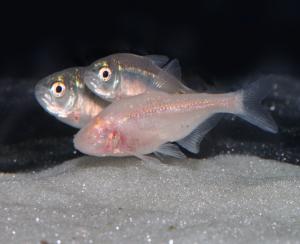Evolutionary researchers examined: How is it possible that hybridizations between blind fish living in different caves, whose separate lineages have not been exposed to light for a million years, resulted in the creation of sighted fish?
Noam Levithan and Yonat Ashhar, Galileo

Richard Borowski (Borowsky) from New York University studied the evolutionary processes that led to the degeneration of the eyes in this species. In an article published in the journal Current Biology, the researcher describes hybrids between blind fish living in different caves, whose separate lineages have not been exposed to light for a million years. If the blindness in the different populations is caused by identical mutations, it will be observed that the offspring of these hybrids will also be blind.
On the other hand, if the blindness is caused by different mutations, it will be observed that at least some of the offspring will regain their sight. This phenomenon, in which normal offspring are obtained from the hybridization of apparently identical mutants, is called complementation (completion) - each mutant contributes to the offspring a gene that codes for a factor that is missing in the other mutant, and thus they complement each other. Indeed, about 40% of the offspring of the hybrids obtained in the experiment developed active eyes, meaning that the normal genes they received from one parent compensated for the defective genes they inherited from the other parent, and vice versa.
Eye test for fish
Previous experiments have shown that some of the hybrid offspring of blind fish have seemingly normal eyes, but how can you check that the fish actually see? The hybrid fry were placed in a gel that prevented them from moving, and their eyes were tested for automatic tracking of a spinning wheel covered in stripes.
Only the eyes of sighted minnows will follow the wheel. The researcher's conclusion was that some of the fry respond to stimulation, meaning they are able to see. In the experiment, the eyes and vision of fry were tested, and not of adult fish, which were created from the hybrids, since the degeneration of the eyes worsens as the fish grows.
From this study it became clear that cave fish blindness developed independently in each cave and in each fish population, as can be concluded from the fact that the mutations that cause blindness are different in each population. However, it is still not known what drives the development of blindness: does the loss of vision and the degeneration of the eyes result from natural selection or does it have no role in this case?
Darwin himself believed that the loss of eyes was accidental, since he could not imagine how the presence of eyes could adversely affect an animal living in a dark environment. According to him, in the event that there is no negative effect, there is no reason for natural selection to "favor" the loss of the eyes.
But today we know that the development of the eye and its maintenance consumes a lot of energy, and therefore many scientists - Borowski among them - believe that the loss of the eyes saves energy and frees it up for other needs, such as a better vibration sensing system, which enables the detection of movement in complete darkness. In this case natural selection plays a role, and fish with smaller eyes will have an advantage over fish with normal eyes.
Strengthening this theory can be found in the fact that all the mutations found in these fish led to the reduction of the eye, and not just to a simple damage to its activity, which could have been random. So the sentence of Desiderius Erasmus that "in the kingdom of the blind the blind eye is king" is not true in the case of the darkness of the caves.

One response
Most interesting